De Vlaamse roman- en toneelschrijver Walter van den Broeck werd geboren in Olen op 28 maart 1941. Zie ook alle tags voor Walter van den Broeck op dit blog.
Uit: Een verliefde monnik
“Het was ook toen dat mijn leeswoede het gezelschap kreeg van een beginnende schrijfwoede, en mijn verlangen naar onsterfelijkheid begon te groeien. Nee, ik wilde geen Methusalem worden, ik wilde sporen achterlaten op deze planeet, die mijn naam zouden spreken als ik niet langer lijfelijk aanwezig was. Ik wilde eerst onsterfelijk worden en dan pas doodgaan.
Doodgaan… Wat erg toch, denk je dan. Maar dat is het pas echt als je beseft geen enkel spoor te hebben achtergelaten, niet te hebben ingegrepen op je tijd en je omgeving, de wereld niet een ietsje beter te hebben achtergelaten dan je hem had gevonden.
En je kinderen dan? Zijn zij niet het levende spoor dat jij zult achterlaten? Je schudt het hoofd, en wat beschaamd ontwijk je de vraag: gaat het om het spoor of om de spoortrekker zelve?
Nog altijd probeer ik te pennen. Nog altijd leg ik sporen. Opdat ik er altijd zal zijn.
Hoelang nog zal ik dit als een noodzaak beschouwen, heren veertigers, vijftigers, zestigers, zeventigers, tachtigers…?
Wie schrijft doet niet meer mee, is verloren voor het leven, maar gewonnen voor de eeuwigheid.
Zoals die West-Vlaamse monnik uit de 11de eeuw.”
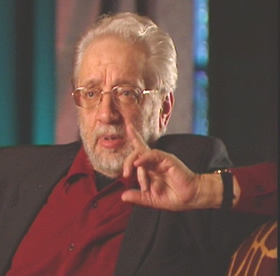
Walter van den Broeck (Olen, 28 maart 1941)
De Peruviaanse schrijver Mario Vargas Llosa werd geboren op 28 maart 1936 in Arequipa. Zie ook alle tags voor Mario Vargas Llosa op dit blog.
Uit: Conversation in the Cathedral (Vertaald door Gregory Rabassa)
“Zoila’s right, at San Marcos he’d lose his contacts,” Popeye’s old lady said. “Boys from good families go to the Catholic University.”
“There are enough Indians at the Catholic University to give you a good scare too, mama,” Popeye said.
“With all the money Fermín’s bringing in now that he’s buddy-buddy with Cayo Bermúdez,the squirt won’t need any contacts,” the senator said. “O.K., Freckle Face, on your way.”
Popeye left the table, brushed his teeth, combed his hair and went out. It was only two-fifteen, it was better to go along marking time. Aren’t we pals, Santiago? come on, give me a little push with Teté. He went up Larco blinking in the sunlight and stopped to look in the windows of the Casa Nelson: those deerskin moccasins with brown shorts and that yellow shirt, wild. He got to the Cream Rica before Santiago, settled down at a table from where he could see the avenue, and ordered a vanilla milk shake. If he couldn’t convince Santiago to go listen to records at his house they would go to the matinee or to gamble at Coco Becerra’s, what was it that Skinny wanted to talk to him about. And at that moment Santiago came in, long face, feverish eyes: his folks had fired Amalia, Freckle Face. The doors of the branch of the Banco de Crédito had just opened and through the windows of the Cream Rica Popeye watched the revolving doors swallow up the people who had been waiting on the sidewalk. The sun was shining, the express buses went by loaded, men and women fought for taxis on the corner of Shell. Why had they waited until now to throw her out, Skinny? Santiago shrugged his shoulders, his folks didn’t want him to think that they were firing her because of the business of the other night, as if he was so stupid. He seemed even thinner with that mournful face, his jet black hair raining over his forehead. The waiter came over and Santiago pointed to Popeye’s glass, vanilla too? yes. After all, it’s not so bad, Popeye cheered him up, she’ll get another job soon, they need maids all over. Santiago looked at his nails: Amalia was a nice person, when Sparky, Teté, or I were in a bad mood they let off steam abusing her and she never told the folks on us, Freckle Face. Popeye stirred his milk shake with the straw, how can I convince you to go listen to records at your place, brother-in-law? he sucked in the froth.”
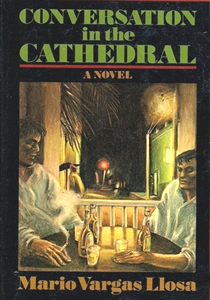
Mario Vargas Llosa (Arequipa, 28 maart 1936)
Cover
De Nederlandse schrijver Joost de Vries werd geboren op 28 maart 1983 in Alkmaar. Zie ook alle tags voor Joost de Vries op dit blog.
Uit: Vechtmemoires
“Door de jaren heen heeft Grunberg de adjectieven van zijn schrijverschap voornamelijk afgeschud: hij is geen cynische of nihilistische schrijver meer, daarvoor zijn er te veel kinderen zijn werk binnengekropen, te veel momenten van oprecht zoeken naar warmte en liefde en geborgenheid. Hij is geen geëngageerde schrijver, want hoeveel van zijn personages door oorlog en terrorisme en andere altijd actuele onderwerpen worden aangeraakt, juist die onderwerpen vormen zijn personages niet. Hun demonen zitten vanbinnen. ‘Kosmopolitisch’ is ook irrelevant want geografische afkomst is nooit van belang geweest in zijn werk. Hij kan niet meer als ‘joodse schrijver’ gelden, want het joodse geloof of de joodse identiteit is nauwelijks nog onderwerp voor hem, het is hooguit een cultuur die hij paraat heeft, als een aas in zijn mouw.
En toch – je kunt je eindeloos buigen over de manier waarop hij zijn humor heeft weten uit te smeren, over hoe zijn stijl is opgedroogd, zijn observaties meer gefocust zijn geraakt, en toch blijft het moeilijk om niet tot de conclusie te komen dat Grunberg de schrijver is van een oeuvre dat al geschreven is: met bijna tien romans en tal van essay- en verhalenbundels, brievenboeken en reportages is het hoogst onwaarschijnlijk dat hij nog met een boek zal komen dat je in onderwerp, toon, stijl, personages of iets anders enorm zal verrassen.
Zijn wereldvisie, tenminste die die hij in zijn romans uiteenvouwt, is uitgekristalliseerd: de mens is een wolf. Wie wil helpen wordt opgegeten. Ook slachtoffers zijn daders. Familie is een valkuil. Liefde is een product dat niet aan de wetten van de vrije markt ontkomt. Zijn romans volgen hetzelfde traject, stevenen altijd af op de publiekelijke en nietsontziende ondergang van zijn serviele, naïeve personages, die het telkens weer met dezelfde abstracte en principiële passiviteit ondergaan. Wie opzoekt hoe het de laatste tien jaar met zijn (mannelijke) personages is verlopen, stuit op een massagraf, of een overbelaste afdeling van de psychiatrische afdeling:…”
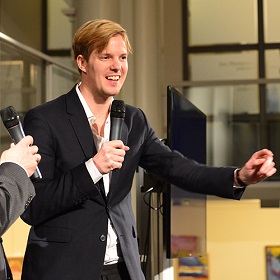
Joost de Vries (Alkmaar, 28 maart 1983)
De Amerikaanse schrijver Nelson Algren werd geboren op 28 maart 1909 in Detroit. Zie ook alle tags voor Nelson Algren op dit blog.
Uit: The Man With the Golden Arm
“Frankie thought it over carefully. ‘In a couple minutes,’ he decided. ‘Half a cup anyhow.’
‘You better,’ Louie counseled him, ‘you’re likely to get so hungry around one o’clock you won’t be able to steal enough for another fix.’
Louie busied himself over the little gas plate in the corner and didn’t look around till he heard the dealer move. Frankie was swaying but he was on his feet and he’d make it fine, all night. All night and maybe the whole week end. It was hard to tell with these joy-poppers. ‘That stuff cost me more than the last batch,’ he said indifferently.
‘I know,’ Frankie grinned, ‘you told me,’ sounding bored while he used a dish towel on his chest beneath the soiled undershirt. ‘Keeps goin’ up all the time, like a kite with the string broke off.’ His eyes were growing heavy, the towel slipped out of his fingers and caught under his arm, hanging there like a flag at half-mast. The junkies’ flag of truce, to guard him as he slept. There beneath a single bulb, flat on his feet, the knees bending a little, the slight body swaying a bit, the flat-bridged nose looking peaked. Hush: he is sleeping the strange light sleep.
“I can’t help it when they up the price on me,” Louie added. “They got me, Dealer, that’s all.”
“The way you got me,” Frankie murmured knowingly. Then he smelled the coffee, got down to the table in front of a cup, took one sip and, smiling softly, started to let his head fall toward his chest. Louie got the cup out of the way of that blond mop before it bent to the table.”
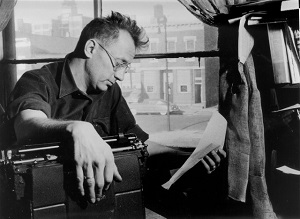
Nelson Algren (28 maart 1909 – 9 mei 1981)
De Zweedse schrijfster Marianne Fredriksson werd geboren in Göteborg op 28 maart 1927. Zie ook alle tags voor Marianne Fredriksson op dit blog en ook alle tags voor M. Fredriksson op dit blog.
Uit: Hanna’s Daughters (Vertaald door Joan Tate)
“Johanna’s secret world followed the clock. It opened at three in the morning and closed again at dawn.
Her world contained a wealth of images, filled with colors, scents, and voices. Other sounds, too. The roar of the falls, the wind singing in the tops of the maples, and the forest rejoicing with birdsong.
On this night the pictures she sees tremble with excitement. It is summer and early morning, with slanting rays of the sun and long shadows.
“You must be mad,”shouts the voice she knows best, her father’s. He’s red in the face and frightening in his agitation. She’s afraid and flings her arms around his leg. He lifts her up, runs his hand over her head.
“Don’t you think, girl?”he says.
But her eldest brother is standing in the middle of the room, handsome, with shiny buttons and high boots, and he’s shouting, too.
“To the cave, all of you, and today, too. They might already be here tomorrow.”
Then another voice, resourceful.
“Listen now, lad. Would Axel and Ole come here from Moss and would Astrid’s lad come here from Fredrikshald to shoot us?”
“Yes, Mother.”
“I think you’ve gone mad,” says the voice, but now it’s uncertain. And her father looks at the soldier, eye meets eye, and the old man can’t mistake the gravity in the young man’s eyes.
“Then we’ll do as you say.”
Then the pictures change, start moving. Feet stomp, burdens are lifted. She sees the earth cellar and store emptied. The great barrel of salt pork is carried out, the herring barrel, the potato bin, the cloudberry jar, the butter in its wooden tub, the hard round slabs of crispbread, all out on the ground, then carried down toward the boat. Sacks filled with blankets and clothes, all the wool in the cottage going the same way, down the slope toward the lake. She sees the brothers rowing. It’s heavy going toward the promontory, easier back.“
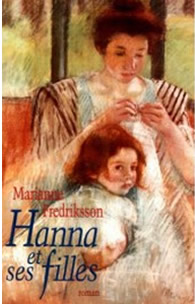
Marianne Fredriksson (28 maart 1927 – 11 februari 2007)
Cover
Zie voor nog meer schrijvers van de 28e maart ook mijn twee vorige blogs van vandaag.
